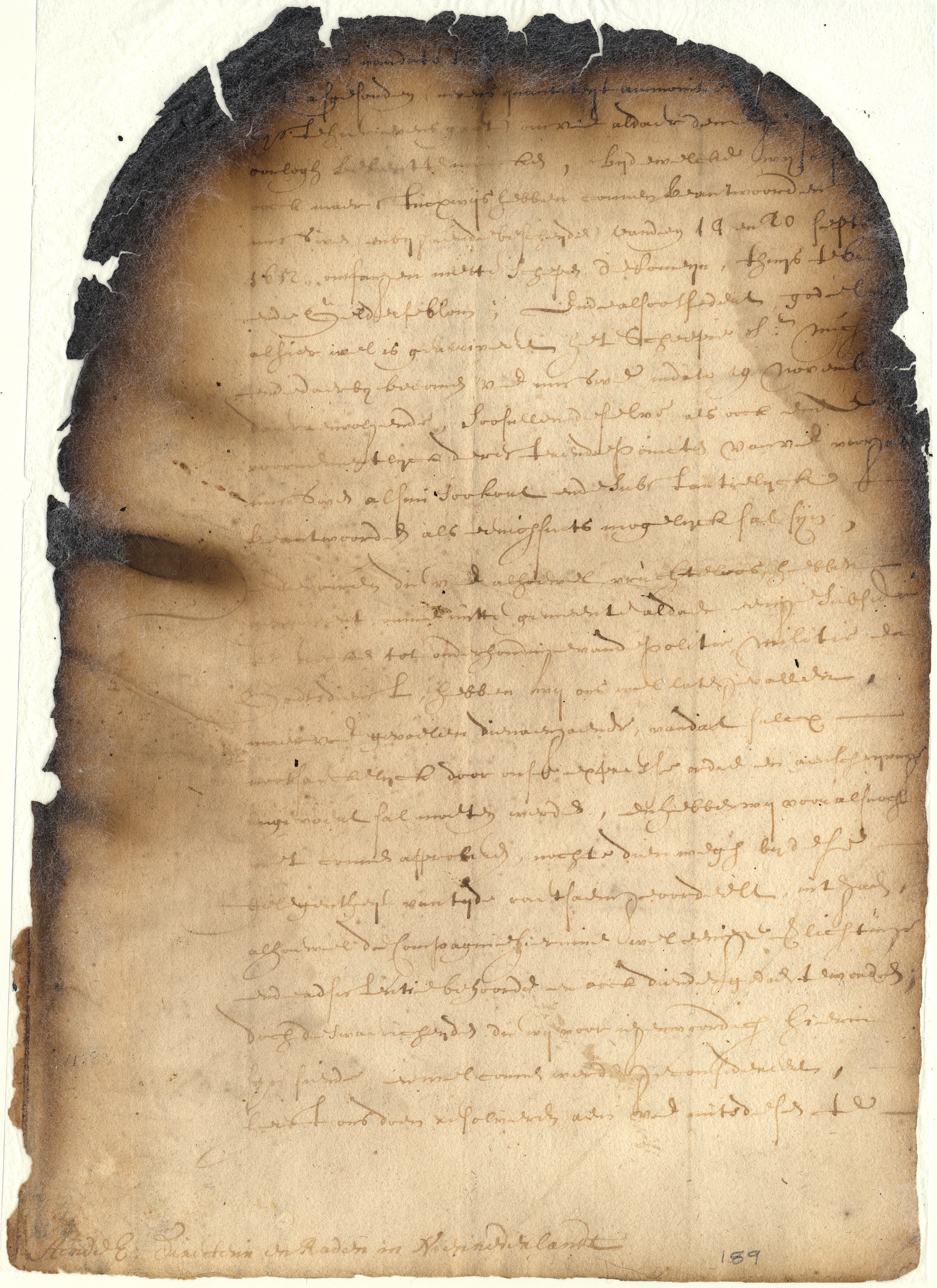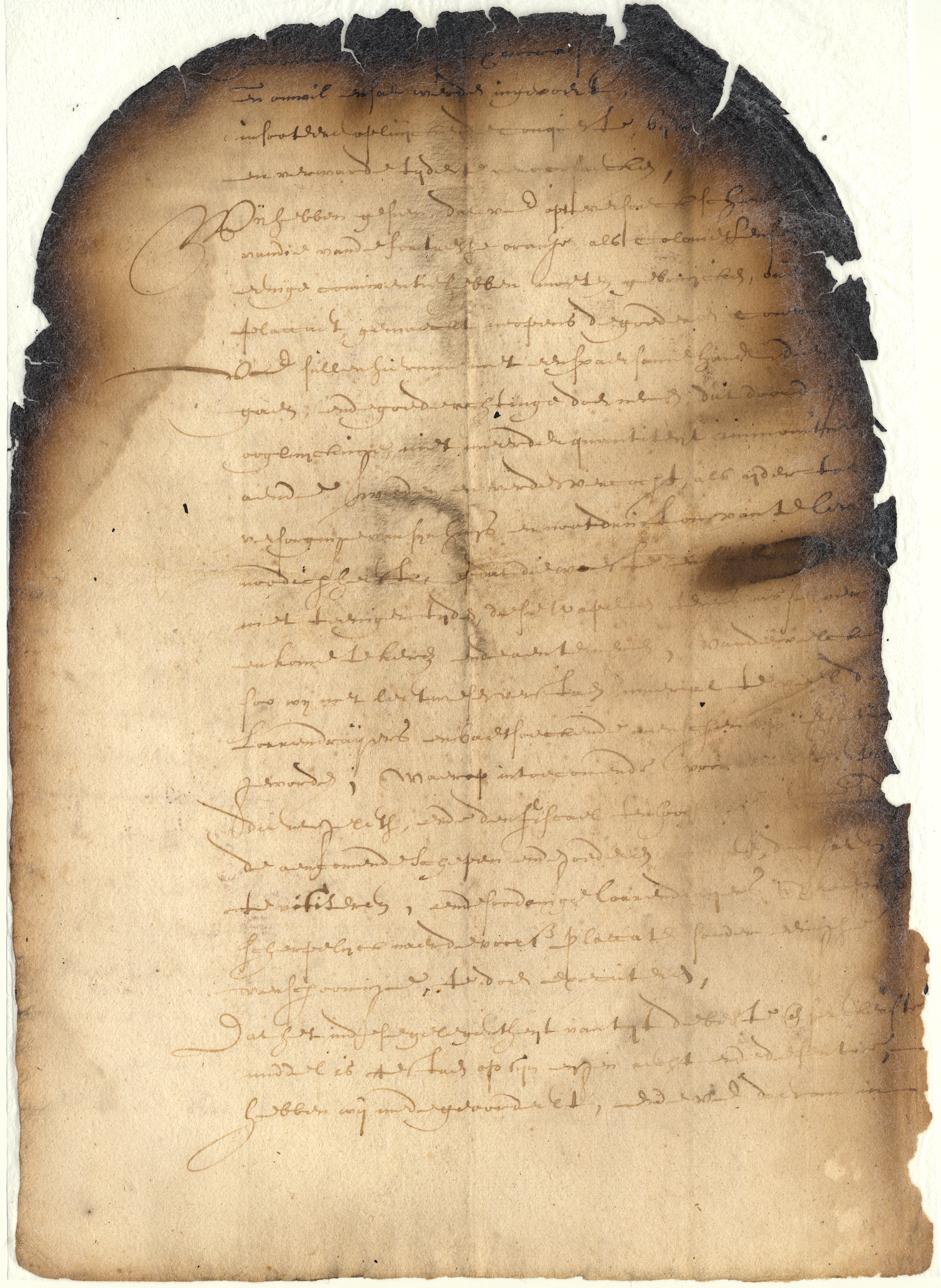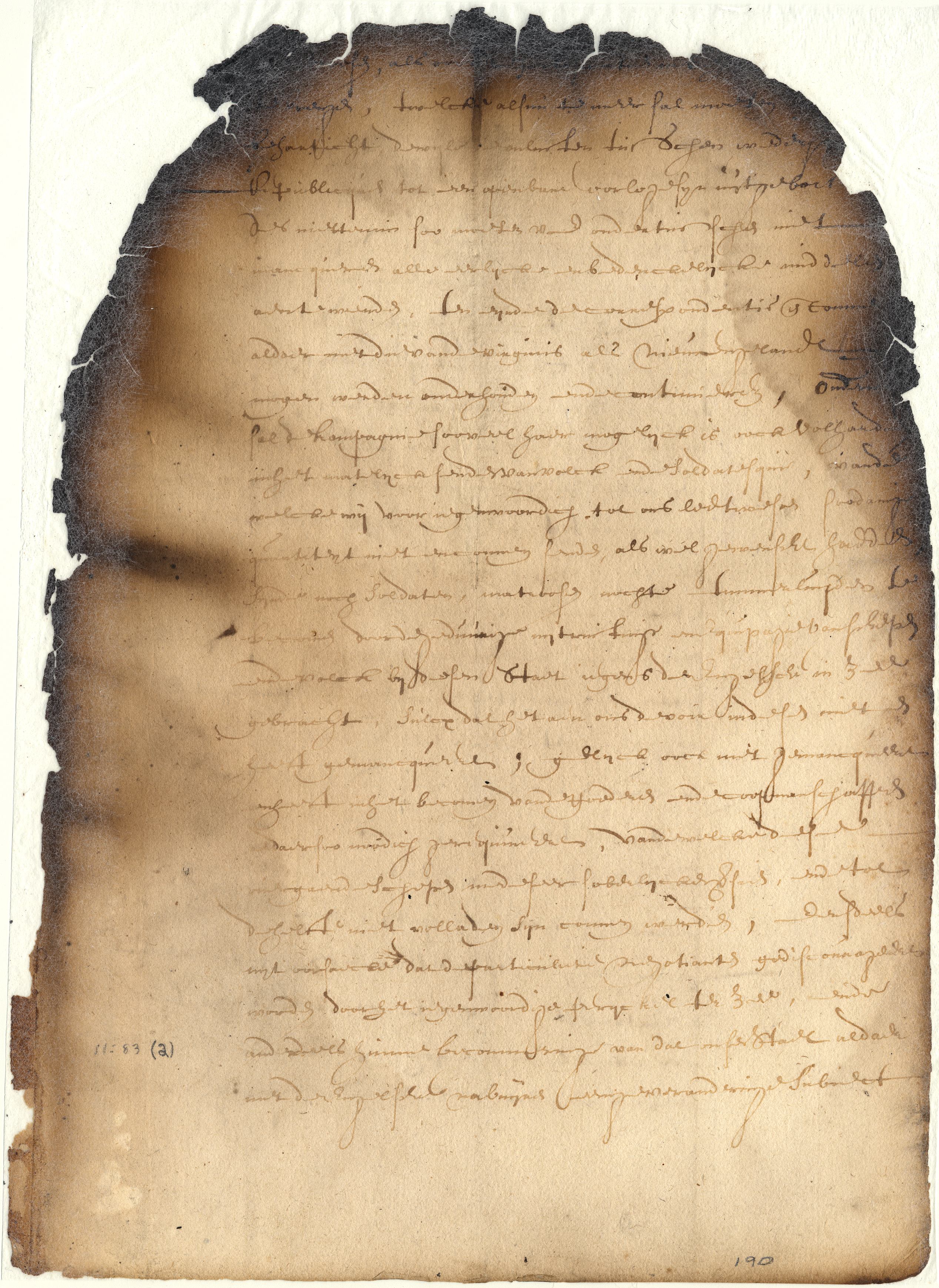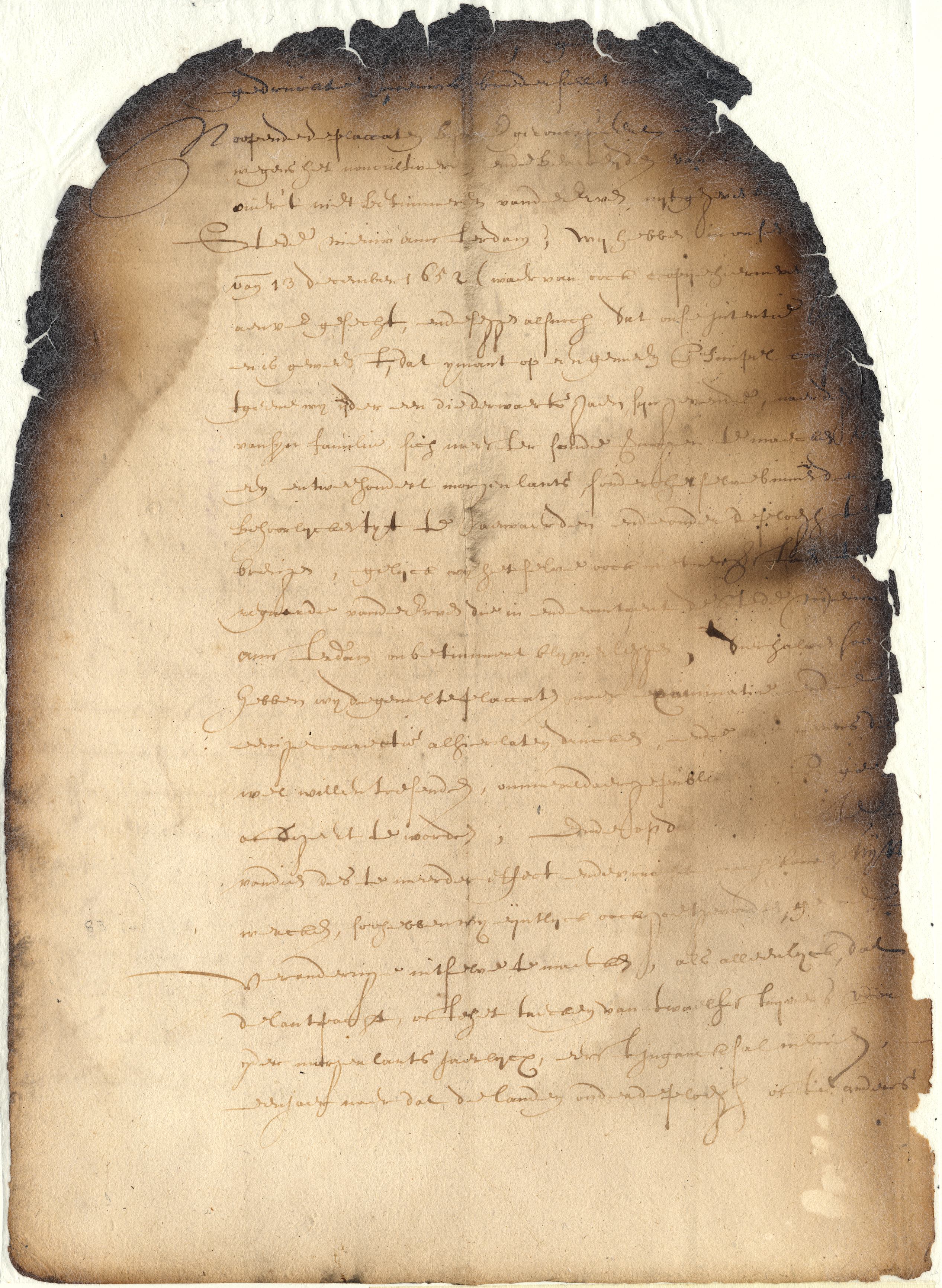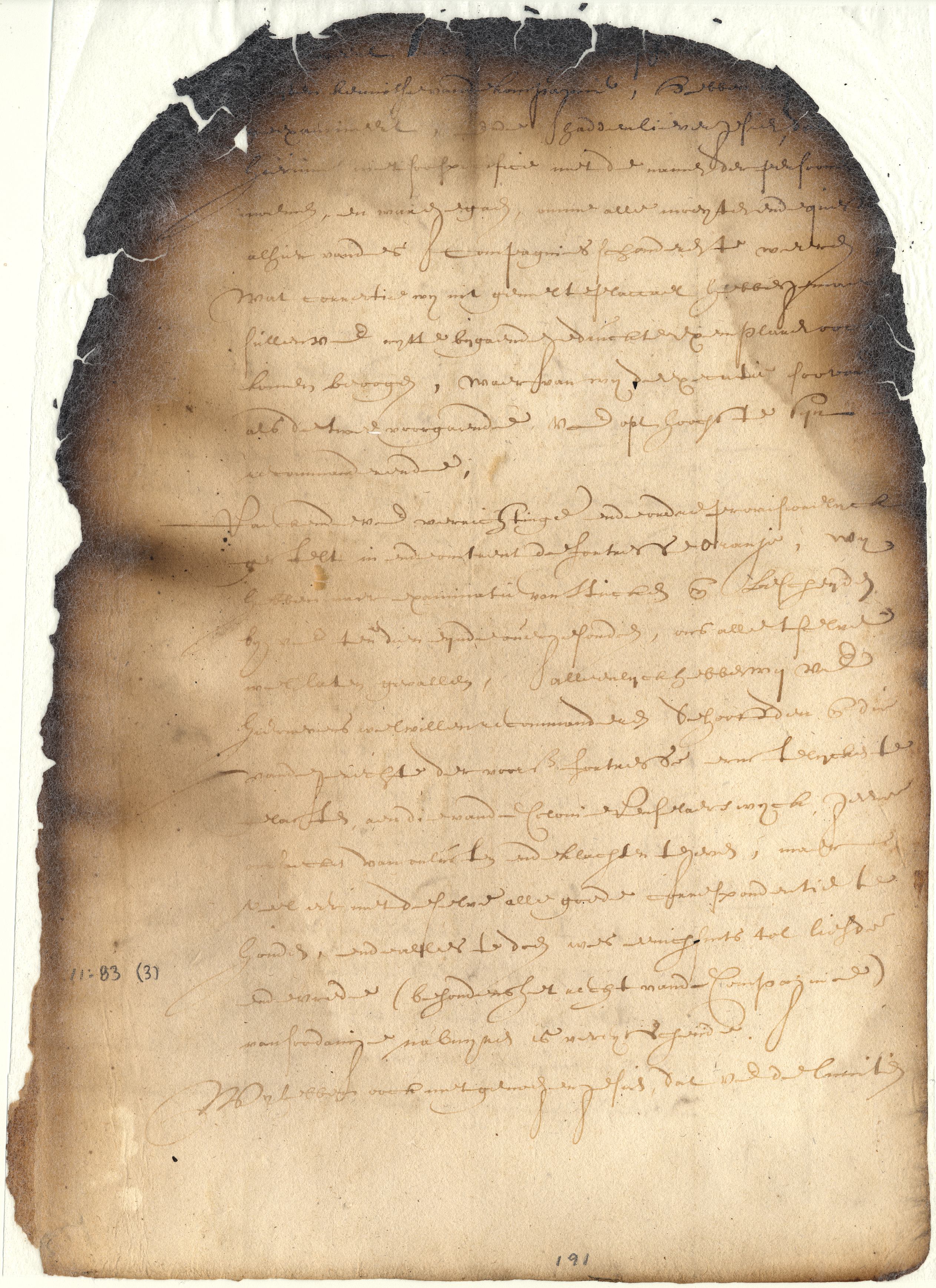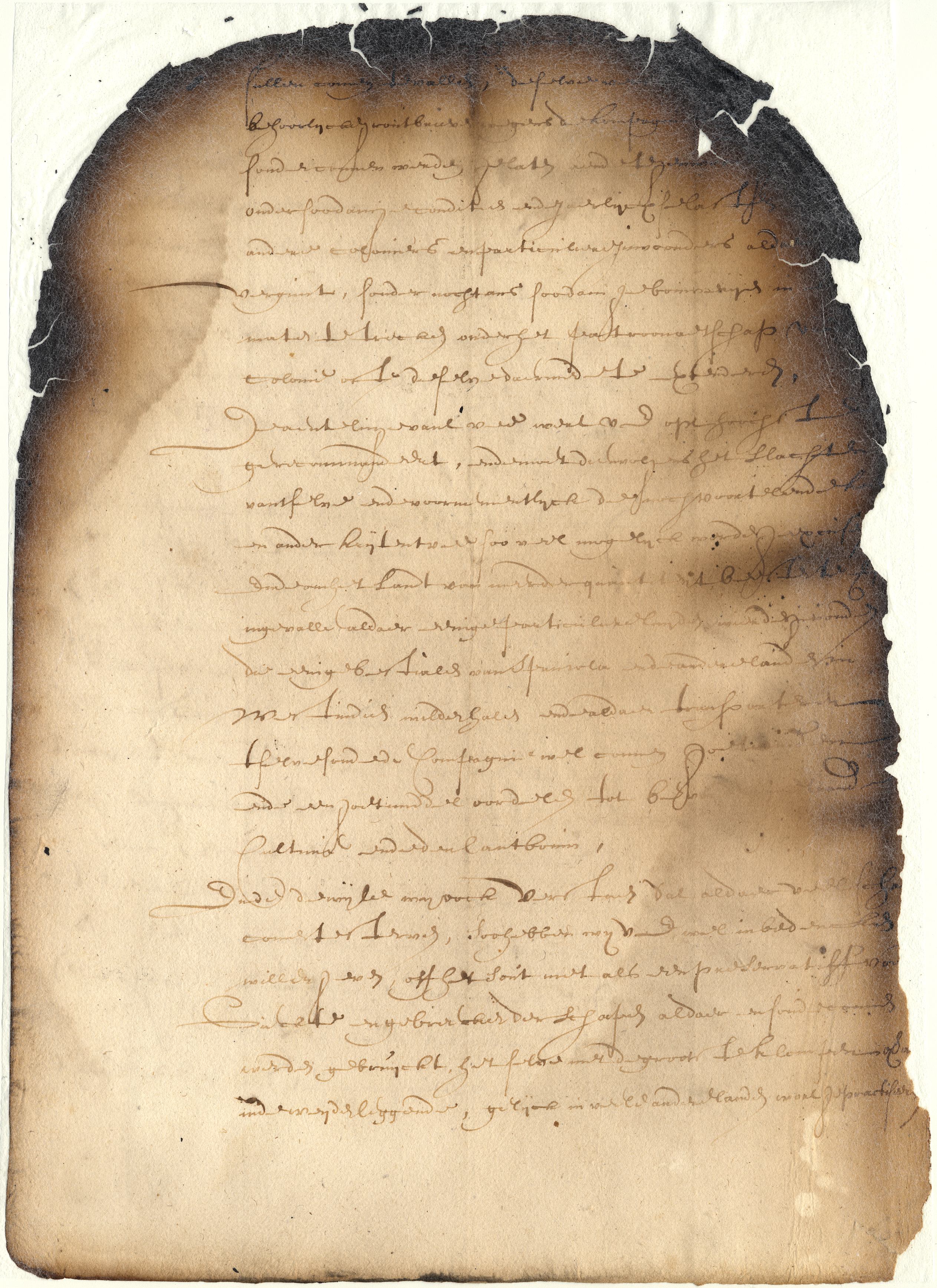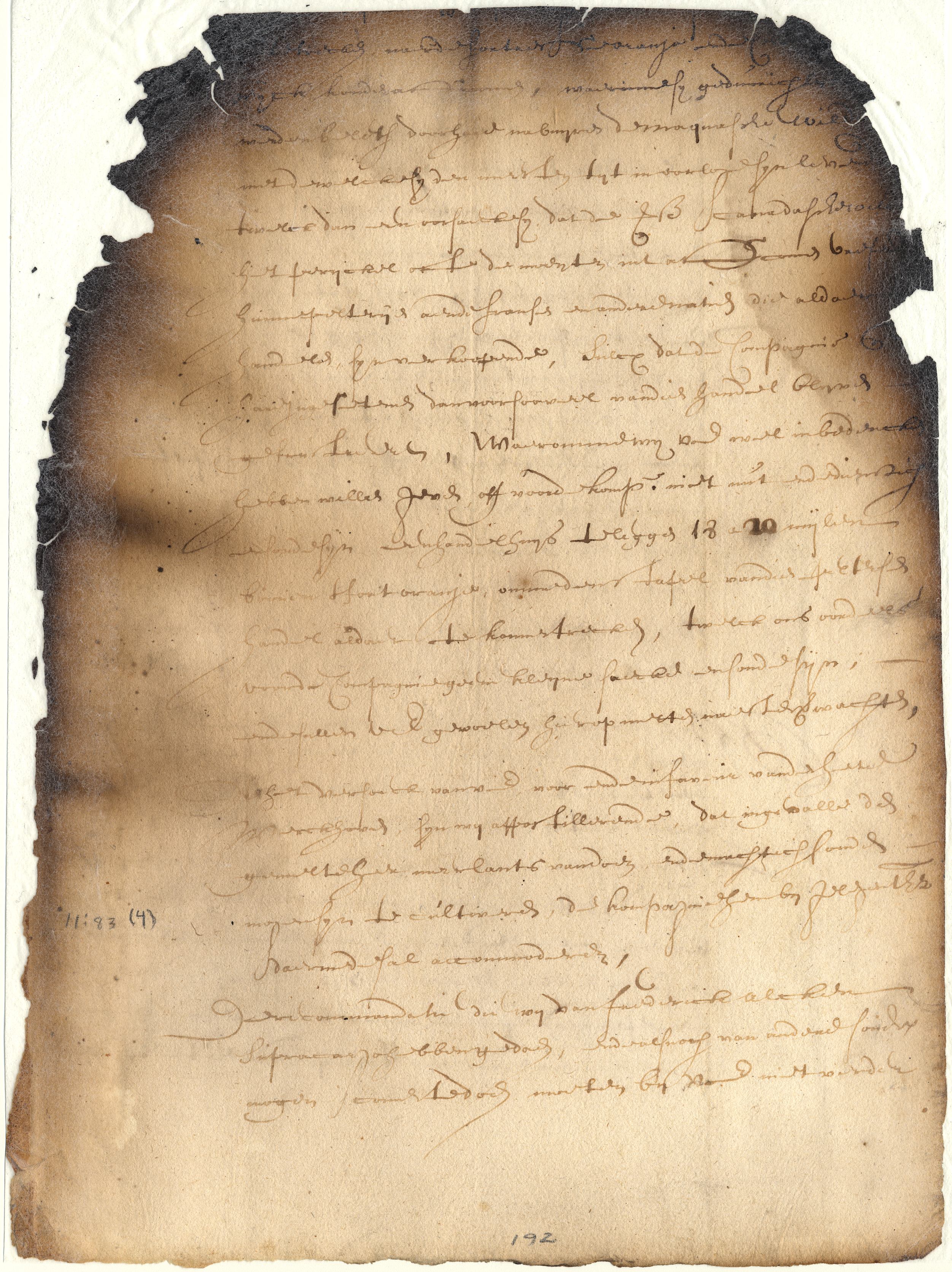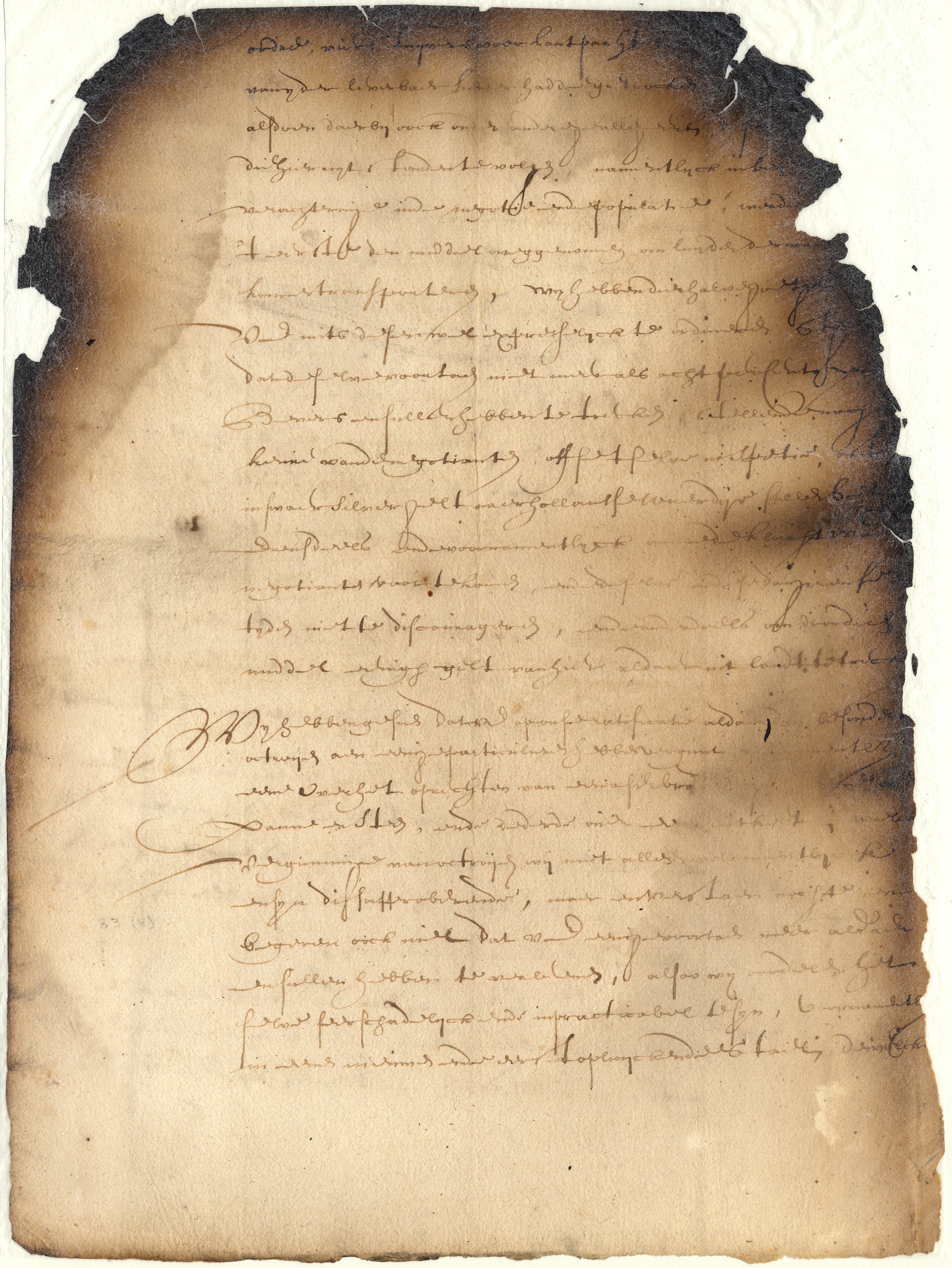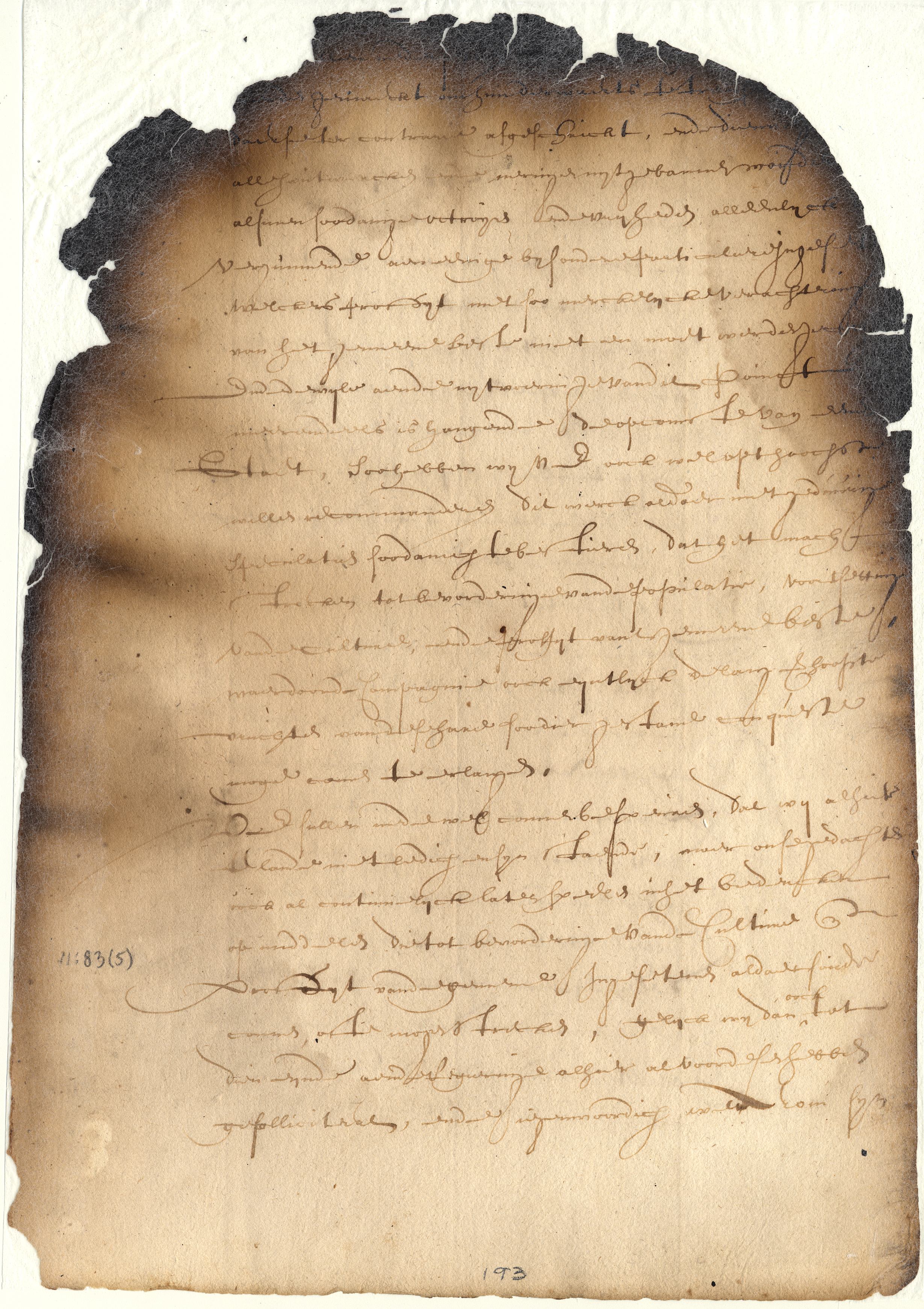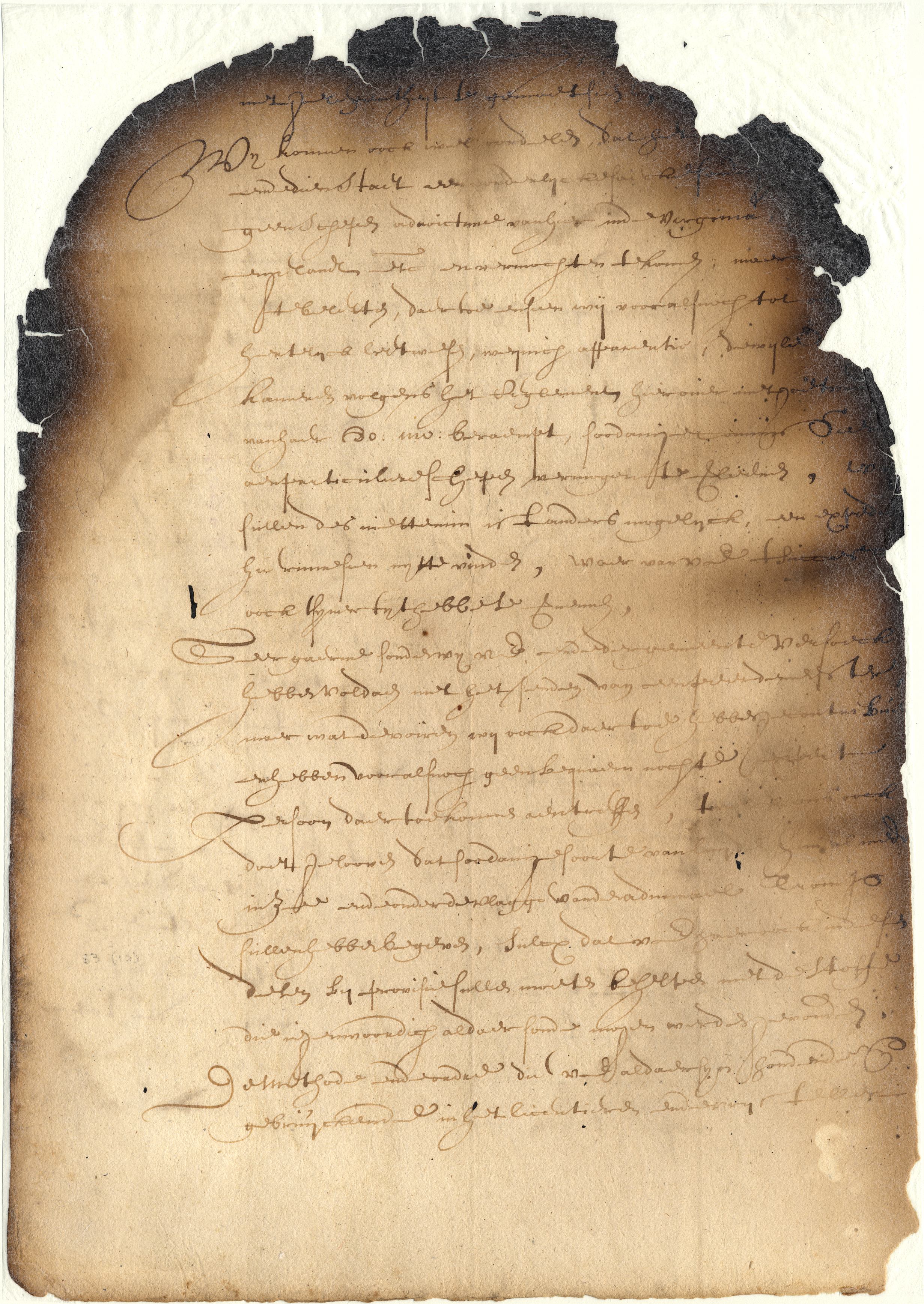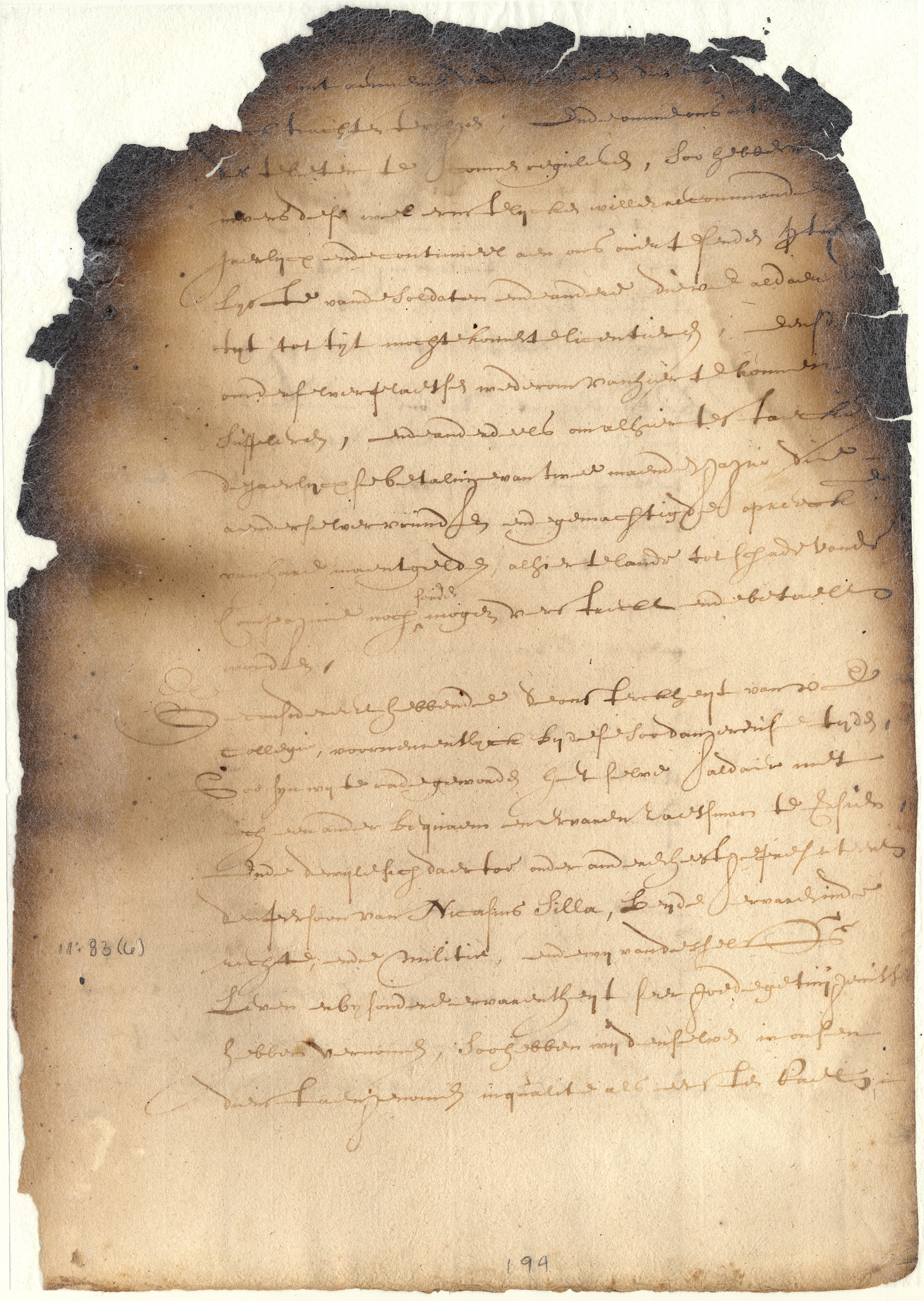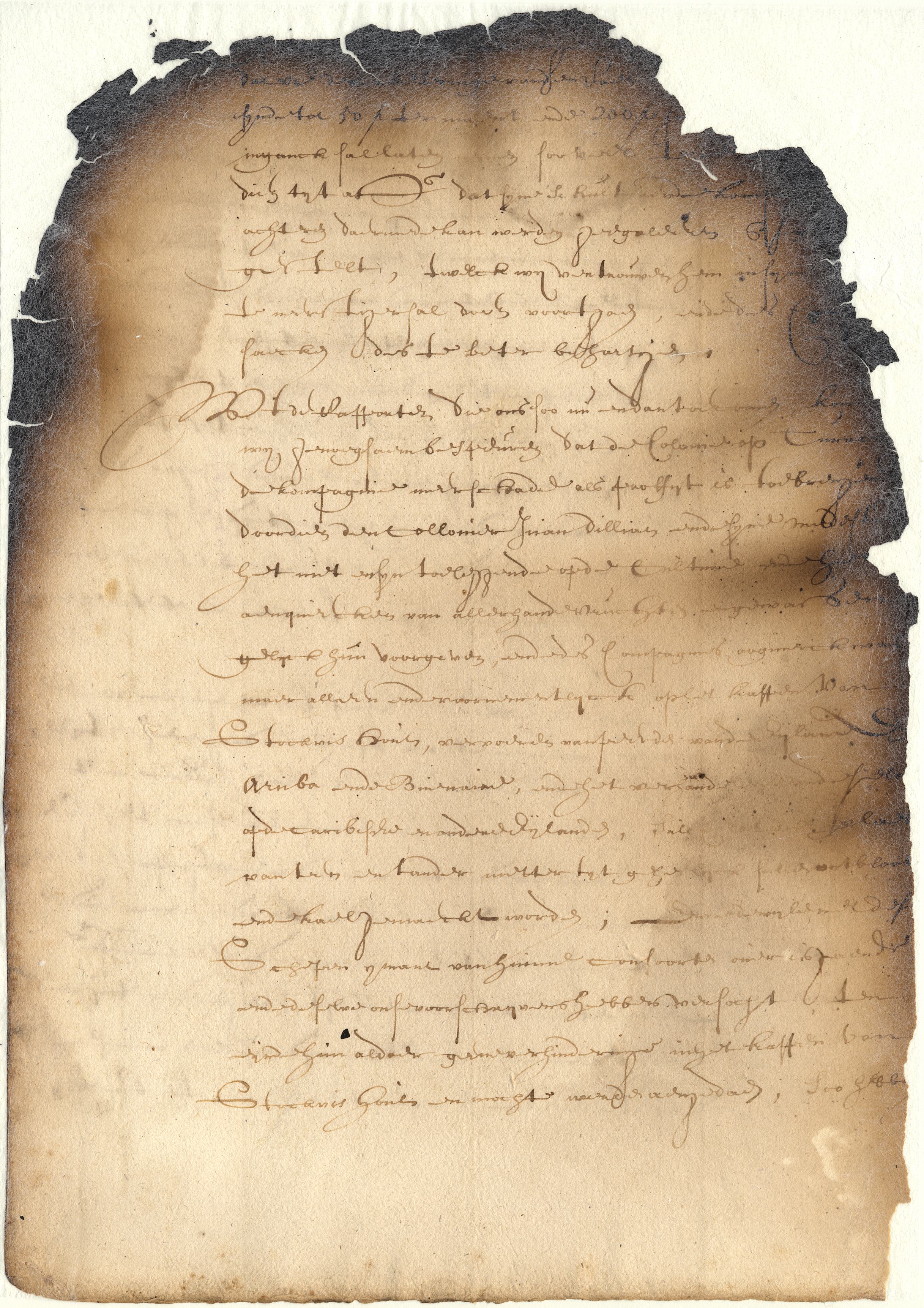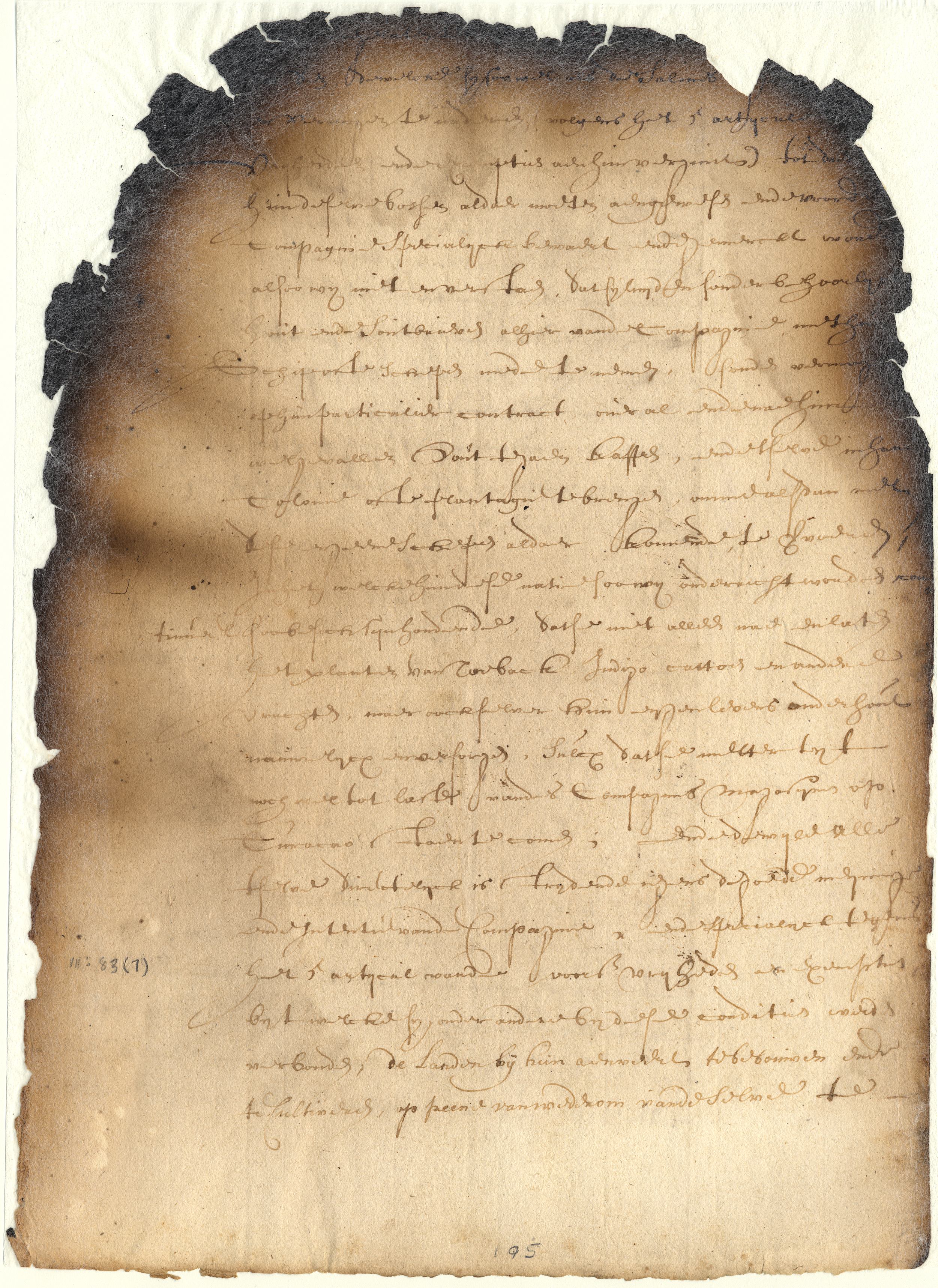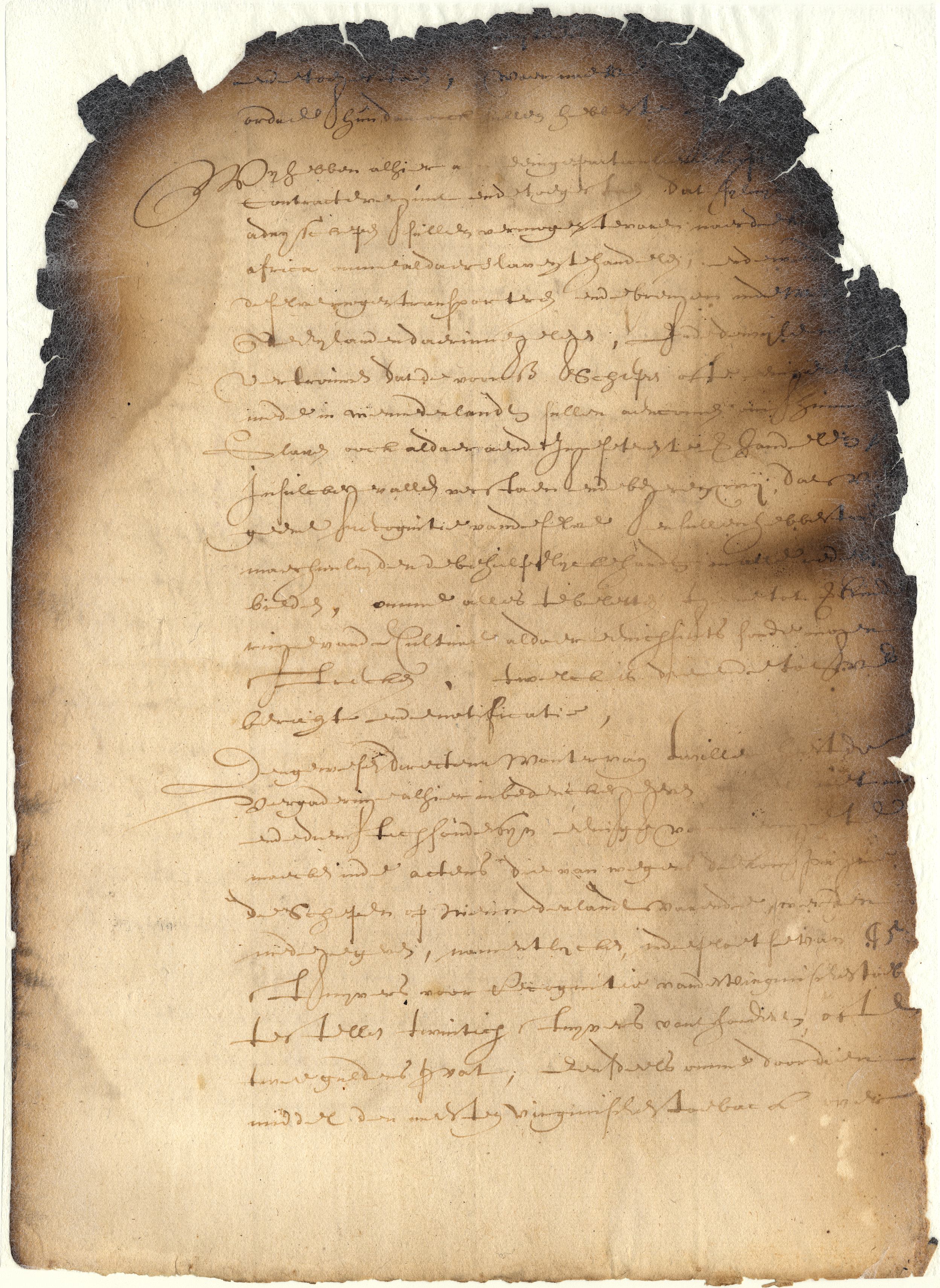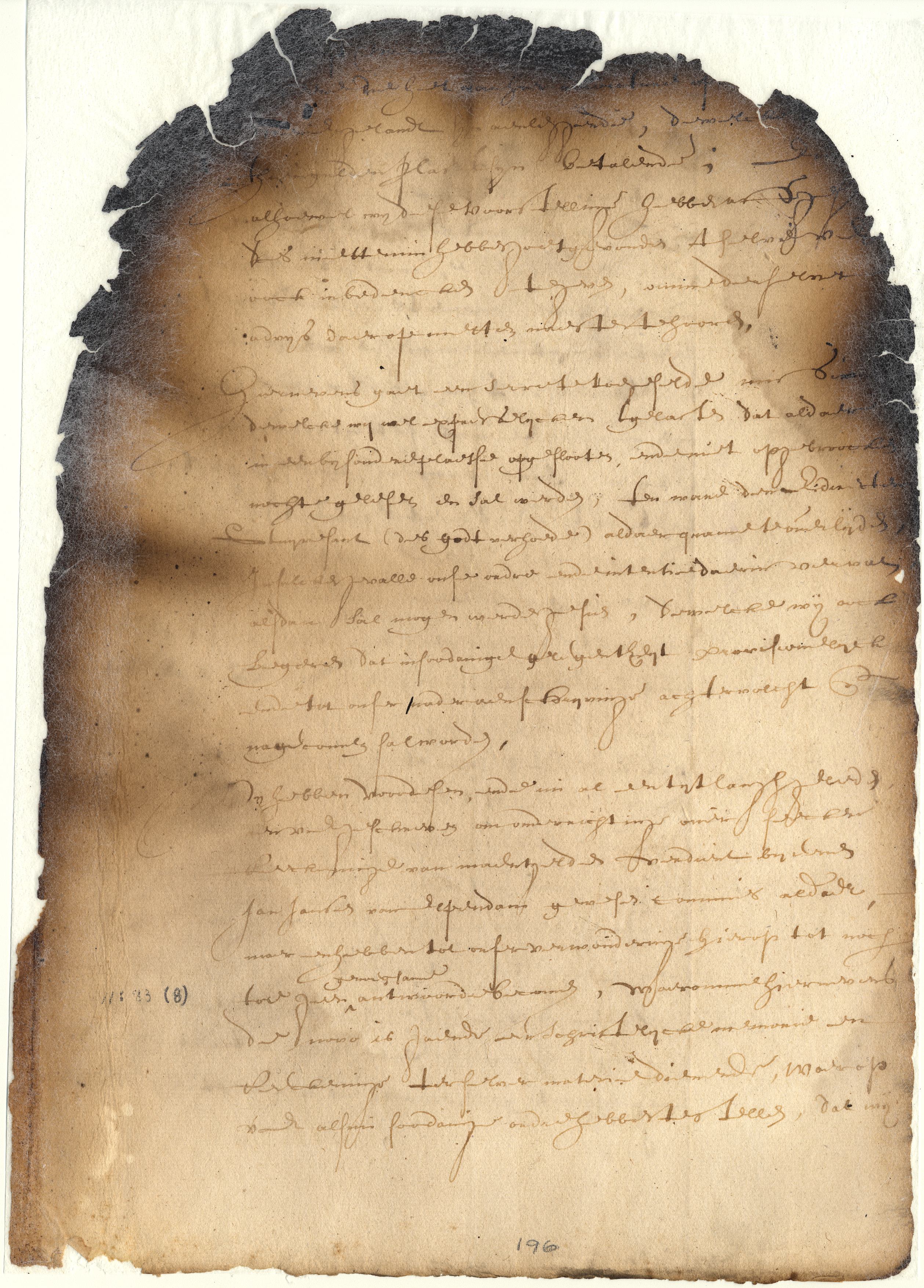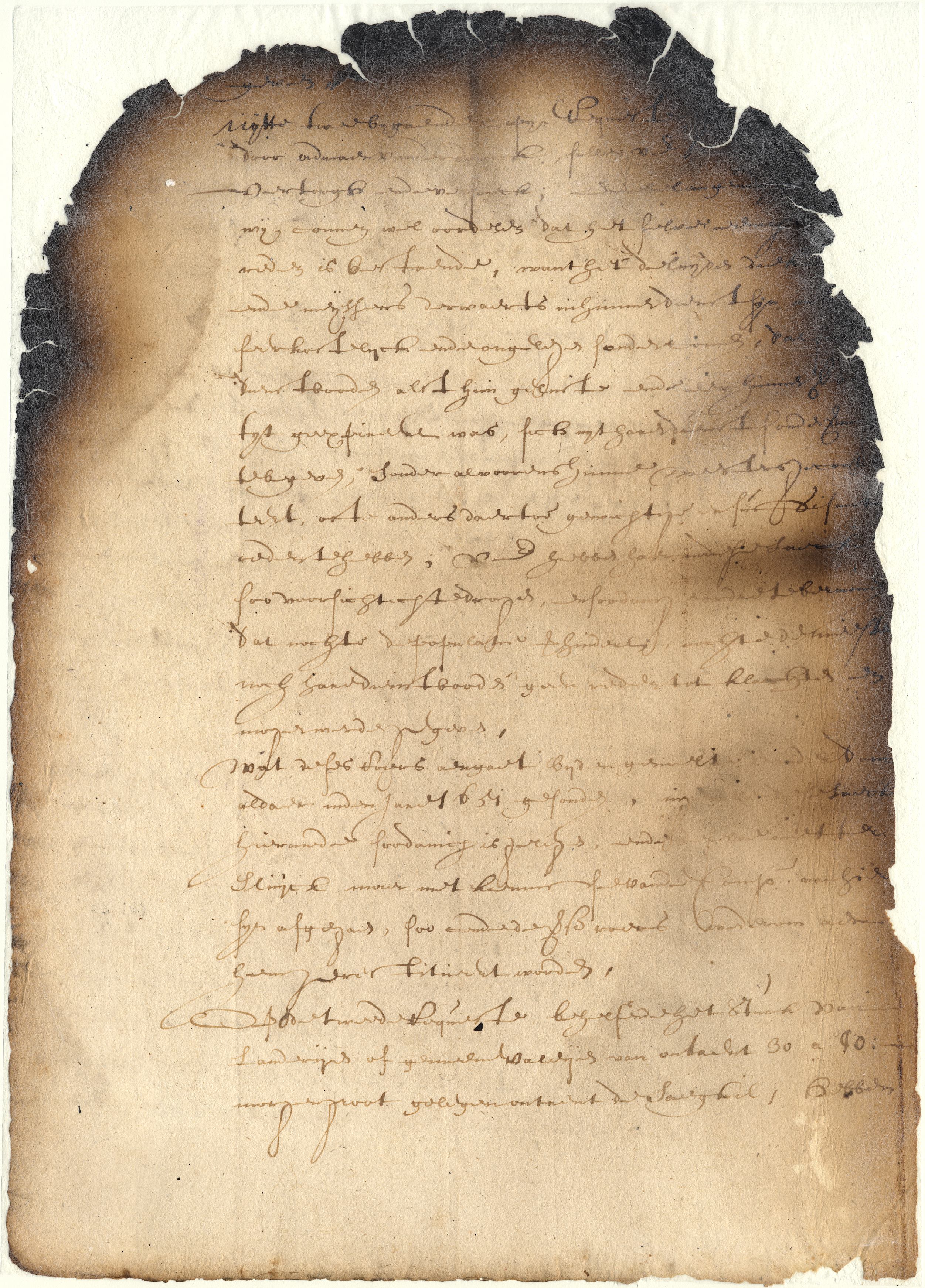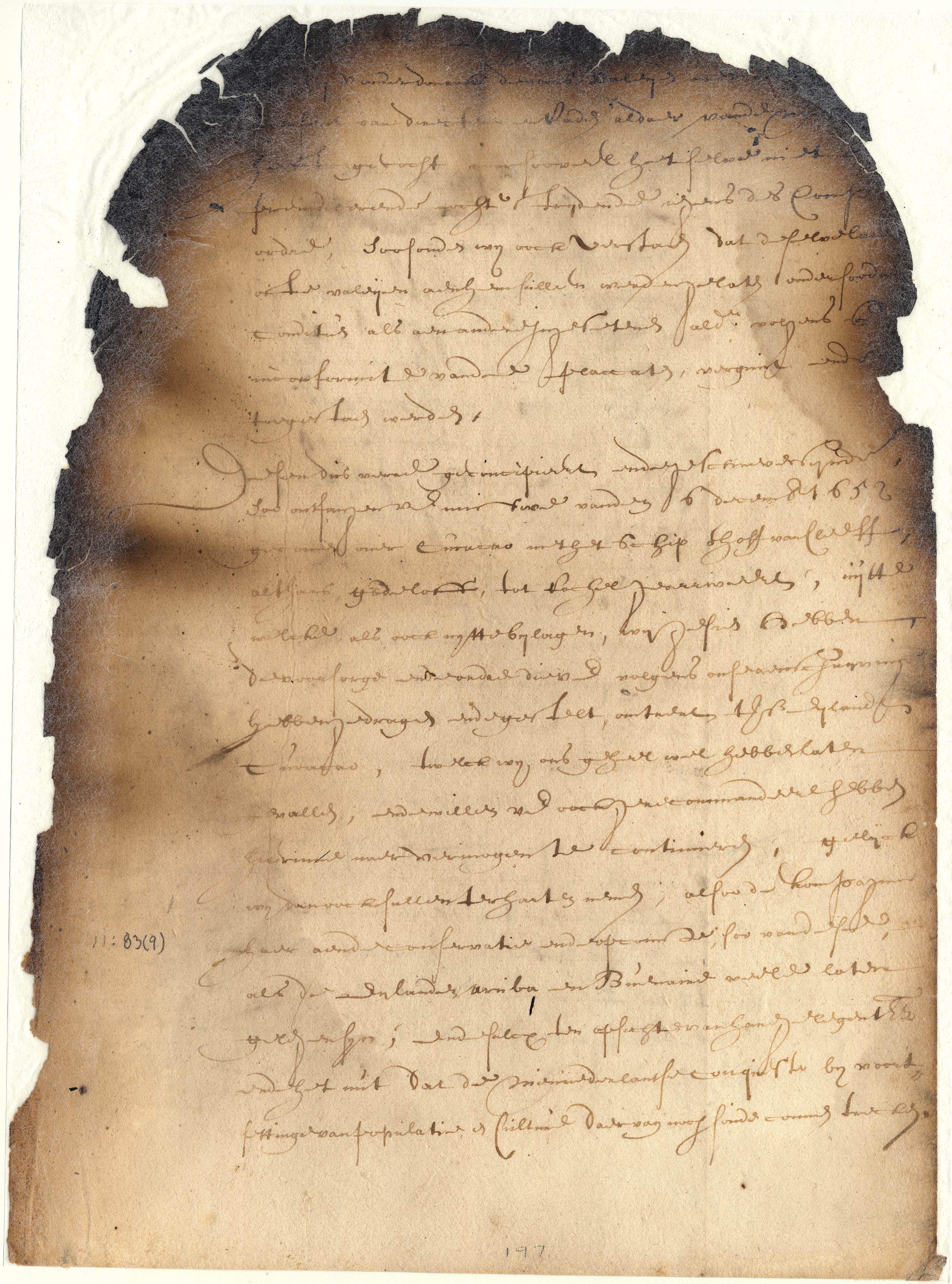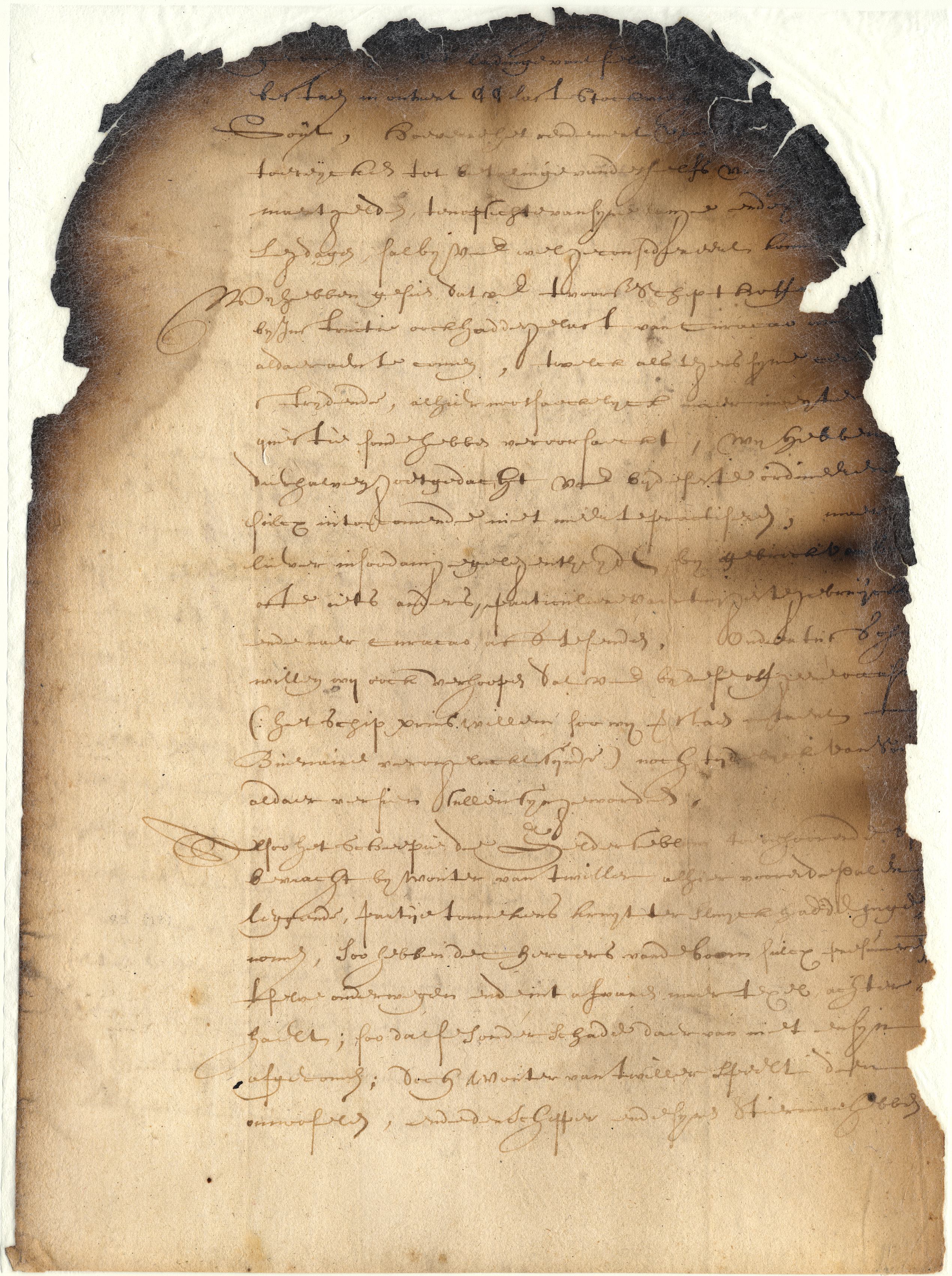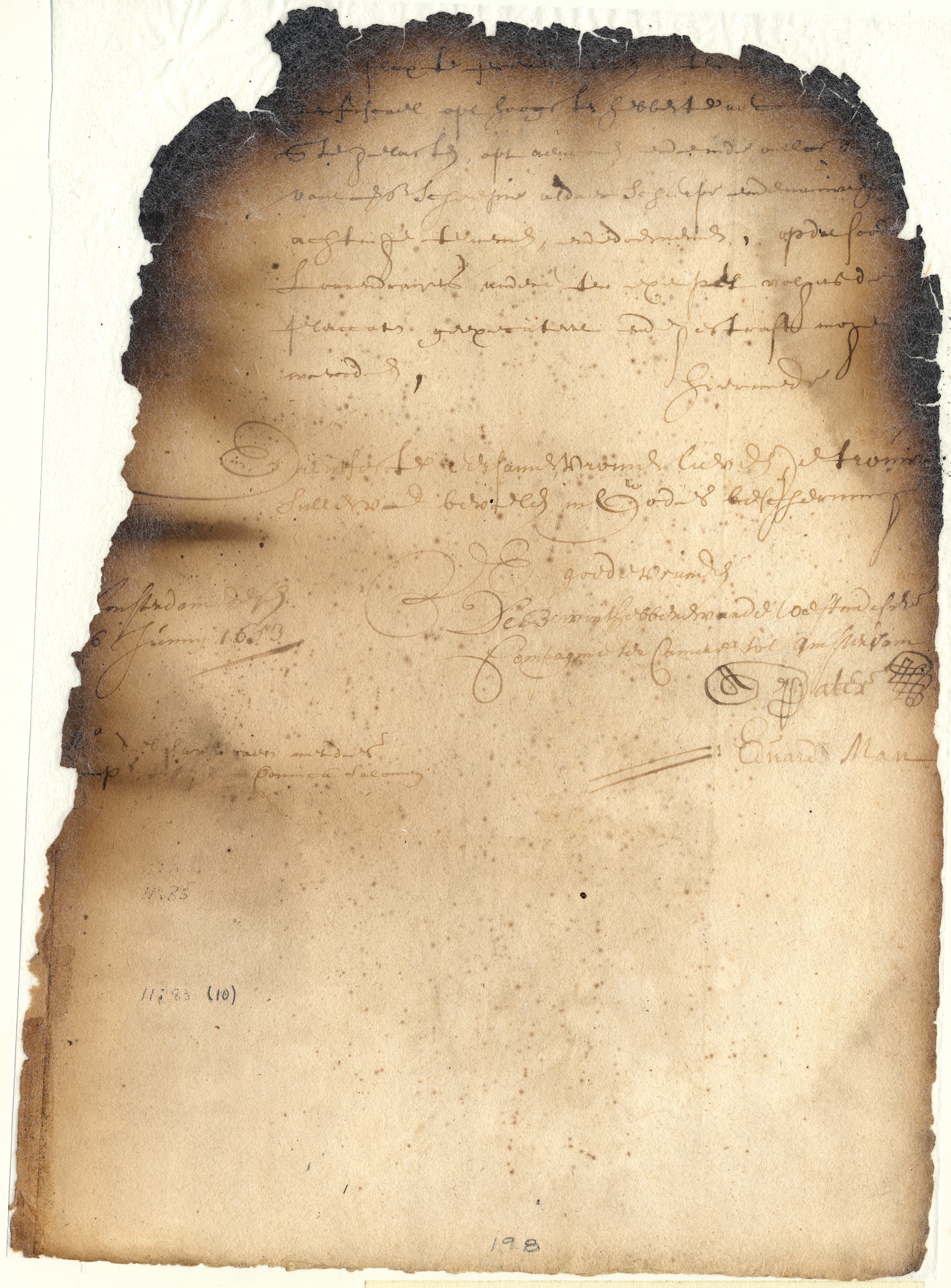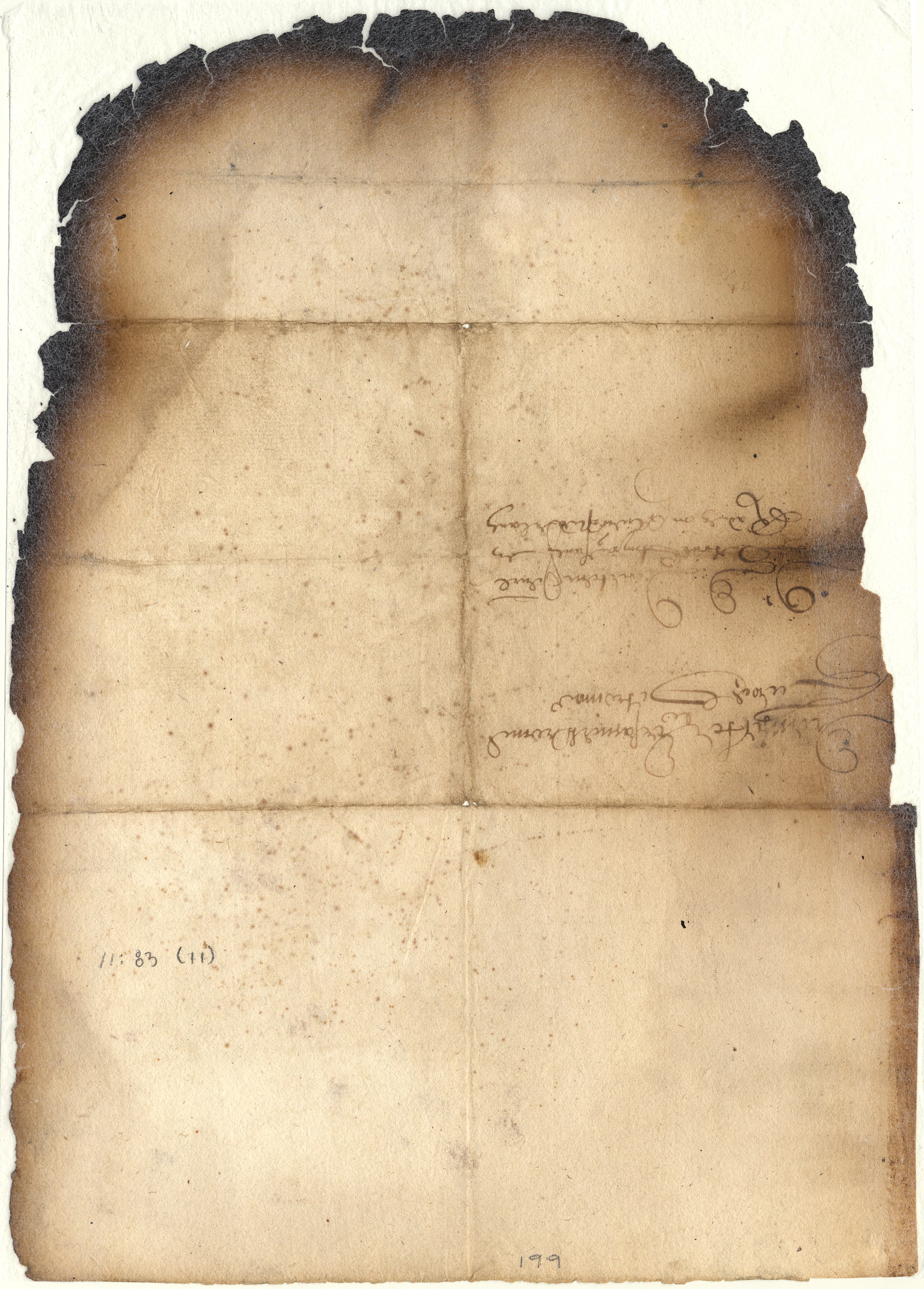[ 1653, June 6th ]
[ Honorable, Worshipful, Pious, Dear, and Faithful. ]
[ Our last to you ] dated the 13th of December 1652 [ by the ship ] called Elbing and was sent off alone and suddenly (with a quantity of munitions, a list of which is enclosed) in order to inform your honor there about the English war, by which we could only answer in part your honor's letters (and accompanying documents) of the 14th and 20th of September 1652 received with the ships de Romeyn, Thuys te Breda and Gelderse Blom, and since, praise God, the small ship St. M ichiel has safely arrived here, by which we received your honor's letter dated 19 November following thereon; therefore, we shall answer the same as well and principally the remaining points of your honor's previous letters as succinctly and substantively as possible.
The means employed by your honor to extract some subsidies from the communities there for support of the civic administration, security, and religion, although fruitless, meet with our approval. However, your honor's feeling with regard to this matter that it is necessary that such shall have to be introduced by our express order and directive, we are unable to approve in any way, nor do we deem it advisable to take up this course at this time, although the Company certainly ought to have some relief and assistance herein and deserve to be considered; however, the difficulties in which we presently see ourselves and which can surely be considered, have caused us to resolve herewith to [ direct ] to your honor [ that if the community there ] cannot be persuaded to make voluntary contributions (which your honor must continuously try to obtain by all possible and gentle means), this measure must not be introduced against their will and pleasure, in order to cause no disturbances in such a blossoming territory during these dangerous and troubled times.
We have seen that your honor, upon the petition of those of Fort Orange and Colonie Rensselaerswijck, has had to wink at the placard concerning contraband goods. Your honor will do well to do so sparingly, and to take care that not a larger quantity of munitions is sold to the Indians through such connivance than each one needs for the provision of his household and with which to pursue a livelihood, so that this savage and barbarian nation at no time tum these weapons against us and attack us there. We understand with regret that smugglers and greedy persons have already provided all too many of them. Strict attention must therefore be paid to this in the future and the fiscal carefully instructed to board and inspect the arriving ships and cargoes, and to prosecute such smugglers and illicit dealers strictly in accordance with the aforesaid placards without mercy.
We have also decided that the best and most certain posture at this time is to rely upon one's own rights and defense, and therefore it was highly recommended in our previous letter dated 6 April 1652 (a copy of which is enclosed) to bring all freemen, soldiers, and sailors, as well as the fortifications into a proper defensive posture, which should now be taken to heart all the more, since the disagreements between both republics have erupted into an open war. Nevertheless, your honor must in the meantime not neglect to employ all honorable and imaginable means for the maintenance and continuation of communication and commerce with those of Virginia.and New England. In the meantime the Company shall, as much as it is possible, persist in sending a moderate number of people and soldiers, of whom we regret for the present not to be able to send in such numbers as we had desired, for neither soldiers, sailors nor even carpenters can be procured because of the constant preparation and equipping of ships and personnel to be put to sea by this country against the English. Therefore, we have not neglected our duty in this matter, just as we have not been negligent in obtaining the goods and merchandise so urgently required there, of which these ships now crossing have been provided sparingly and were able only to be loaded to half capacity; partly because private merchants are discouraged by the present danger at sea, and partly because they are afraid that our status there with the English neighbors would be suddenly altered; moreso because parliament has once again been dissolved and General Kromwel[1] has provisionally established another form of government there, as your honor shall learn from the enclosed printed news.
Concerning the placards drafted and sent over by your honor in regard to the noncultivation and improvement of land as well as in regard to failure to build on lots granted within the city of New Amsterdam, we have said to your honor in our last letter of 13 December 1652 (a copy of which is also enclosed) and we say it again that our intention has not been that anyone should be made master of one and two hundred morgens of land upon a simple and general consent, which we have given to everyone going there, according to the size of their family, without possessing the same within the appointed time and bring it under the plow, as it is also our understanding in regard to unimproved lots existing in and around the city of New Amsterdam. Therefore, we have had the aforesaid placards printed here after examination and some corrections, and intend to send them herewith to your honor so that they can be proclaimed and affixed there; and so that the first of these may have a better effect and result, we have also finally resolved to make no changes in it (in you honor's aforesaid draft) except that the quitrent or the yearly payment of twelve stivers for each morgen of land shall commence not until one year after the lands are brought under the plow or otherwise put to use, as your honor shall see in more detail from the printed copies.
We have also examined [ the placard ] concerning illegal purchases of land without the knowledge of the Company, and we would have preferred that your honor had not been so specific in naming the names of the persons herein, in order to prevent any difficulties and quarrels from the Company's detractors here. Your honor will be able to see from the enclosed copies[2] what corrections we have made in the aforesaid placard, and we earnestly recommend execution of this one as well as the other two.
Concerning your honor's proceedings and provisional order made in and around Fort Orange, we have, after examination of the papers and documents sent over by your honor for that purpose, completely approved all of them. We only wish to advise your honor herein that the chief officers and those of the court of the aforesaid fortress, be earnestly instructed not to give the people of the Colonie Renselaerswijck any cause for discontent and complaint but rather to maintain a good relationship with them and to do everything necessary for peace and friendship with such neighbors, without prejudicing the rights of the Company.
We have also been pleased to see that your honor has not extended the boundaries of the Colonie Renselaerswijck any farther than the freedoms and exemptions allowed therein; and with regard to the farms, which should happen to fall outside the boundaries because of this, we are of the opinion that the same, granted under proper patents on behalf of the Company, could be left to the present owners under such conditions and yearly taxes as is granted to other colonists and private inhabitants there, without however drawing such farms, in this way, under the patroonship of the Colonie, or thereby extending it.
The propagation of livestock is most earnestly recommended; and therefore, the slaughtering of the same, especially cows still capable of breeding and other young stock, must be prevented as much as possible; and if, in order to provide the country with an increased quantity of animals, some private parties can be found there who are willing to procure some animals in Hispaniola and other lands in the West Indies and transport them there, the Company would approve thereof and consider it a good way to promote husbandry and agriculture. And whereas we have learned that many sheep have come to die there, we would like for your honor to consider whether salt could not be used as a preventative against the sicknesses and distempers of the sheep there by spreading large clumps of it everywhere in the pastures, as is the practice in many other countries.
We have been informed here by good authority that large quantities of peltries could still be obtained from the Canadian Indians there, if [ these tribes ] can come down [ without danger and without being obliged to take a circuitous route ] to Fort Orange and Colonie Renselaerswijck. However, they have constantly been hindered therein by their neighbors the Mohawk Indians with whom they have been living continually in a state of war. This may then be one reason why the aforesaid Canadian Indians, fearing the danger or the troubles in coming down, have been selling their peltries to the French and other nationalities who trade there. As a result, the Company and their settlers have been denied so much of this trade. Therefore, we want your honor to consider whether it would not be beneficial to the Company to establish a trading house 18to 20 miles above Fort Orange to serve as the center of the fur trade there. It is our opinion that it would be no small matter for the Company, and we shall await your honor's thoughts thereon at the first opportunity.
Upon your honor's favorable petition concerning the honorable Van Werckhoven, we have recommended that, if the aforesaid gentleman is ready and able to cultivate more land, then the Company shall accommodate him as is suitable.
The recommendation which we have given to Frederick Alcken, supracargo, and those we might also give to others, must not be considered any further by your honor than service to the Company requires.[3]
[ As we have said in our last to you, it has surprised us that against our previous ] orders your honor had levied four stivers for quit-rent [ besides the 8 percent ] from each merchantable beaver. We stated then, among other reasons, the difficulties likely to follow from that measure, namely a retardation in both trade and population because [ by the decrease of ] the former we are deprived of the means to be able to transport people over there. Therefore, we have hereby decided expressly to order and command your honor that the same henceforth shall not have to pay more than eight percent for beavers, giving merchants the choice whether to pay the same in specie or in heavy silver money according to the value in Holland; partly and principally to avoid complaints of the merchants and not to discourage them in these dangerous times; and on the other hand to draw money, in this way, from here into the country there.
We have seen that your honor has granted three charters to some private parties, subject to our ratification; namely, one regarding the establishment of a potash works, one regarding pantile and brick, and the third regarding a salt house.[4] We not only totally disapprove of the granting of such charters but also neither approve nor desire that your honor shall be moved to grant any more there henceforth because we deem such to be most harmful and impractical, especially in a newly developing country which must be formed by those freedoms to be granted to everyone who [ desires to settle there with this or that occupation or craft which encourages ] people to transport themselves over there. Whereas, on the contrary, they are deterred in doing so and as a consequence all crafts and occupations are banned, if such charters and freedoms are only granted to a few special private inhabitants, whose profit must not be acquired at the expense of such a considerable retardation of the general welfare. And whereas the growth of a country depends to a great extent on the execution of this point, we want to recommend strongly that your honor pay particular attention to such matters there so that it may tend to the advancement of the population, promotion of agriculture, and profit of the general welfare, whereby the Company finally may come to harvest the long-awaited fruits of this their so dearly purchased territory.
Your honor can clearly see that we are not idle over here but that our thoughts are constantly engaged in considering means which could or might tend to the promotion of agriculture and the profit of the general inhabitants there. For this purpose we have even previous to this petitioned the administration here, and are presently petitioning it again with regard to repealing the tax on [ tobacco ] grown there. Your honor can communicate this to the deputies of the commonalty and look for a resolution thereon in due course.
We can also easily conceive that it would be profitable for the Company and this government if no ships were authorized to sail directly from here to Virginia, New England etc.; but to stop such, to our deep regret, there is very little chance for the time being because the other chambers are authorized to grant such commissions to private ships, according to regulations hereon, made with the approval of their High Mightinesses. Nevertheless, we shall, if at all possible, try to find an expedient herein, the success of which your honor shall hear in due time.
We would have gladly granted your honor's and the commonalty's request to send over a horse veterinarian but despite all our efforts we have as yet been unable to locate a capable or expert person. It makes us think that this class of people has already gone to sea under the flag of Admiral Tromp. Therefore, your honor shall have to make do with the means presently available there.
We are quite pleased with the method and orders which your honor has instituted and employed in discharging and releasing of soldiers under certain specific conditions; and it is our opinion that the same is a suitable means for always having a prepared and trained body of soldiers on hand. When we enlist soldiers here, we shall try to follow [ your rules ]. And in order to be able to regulate ourselves better in the future, we strongly recommend that your honor send over to us annually and on a regular basis an exact list of the soldiers and others whom your honor should come to discharge there from time to time; partly in order to be able to fill the vacant position again from here, and partly to put an end to the annual payment of two months wages which might still be advanced and paid to their friends and attorneys from the book of monthly wages kept here, to the detriment of the Company.
Having considered the weakness of your honor's board, especially in such dangerous times, we have resolved to provide the same there with another capable and experienced councilor; and whereas the person of Nicasius Silla, among others, has presented himself for the position as both experienced in the law and the military, and whereas we have heard very good testimony concerning his life and specific experience, we have employed him in our service in the position of first councilor of the director at a salary of one hundred guilders per month with board money included therein. Your honor shall be able to learn more about this matter by our ship the Coninck Salomon. We have also decided out of special consideration that your honor shall allow commencement of the improvement of Councilor La Montagne' s salary to 50 per month and 200 annually for board as much sooner and from whatever time that his debt to the Company can be cleared and balanced thereby. We trust that this will allow him to continue in his office and devote even more energy to the Company's affairs.
From the reports which we receive from time to time, we can understand well enough that the colony on Curaçao is causing more loss to the Company than profit because of the colonizer Juan Dillian and his colleagues who are not inclined to pursue agriculture and grow all sorts of fruits and produce as they pretended, and which was the intention of the Company, but rather inclined only and above all to cut dyewood, to take horses from the islands of Aruba and Buenaire, and to trade the same in the Caribbean and other islands, so that places shall become completely depleted of one and the other and stripped bare. And whereas one of their associates is going over with these ships and the same has petitioned our superiors that they not be hindered there in their cutting of dyewood; therefore, we want to [ ] and recommend hereby that your honor bring about good order and pay close attention that this deceitful nation neither be allowed to cut any wood nor take any out of the Company's woods, just they are not allowed to share in or go near the salt (pursuant to article 5 of the freedoms and exemptions granted to them) for which reason these woods must be shown to them and especially preserved and marked for the Company, because we do not understand that they should be allowed to go cut wood everywhere as they please with their private contract, without proper wood and salt permits from the Company here to transport it with their ship or ships, and to bring the same to their colony or plantation in order then to be able to export it with this or that ship there. We have been told that this nation continues to busy itself in this manner and that they not only neglect the planting of tobacco, indigo, cotton and other products but also are hardly able to provide for their own sustenance, so that in time they will surely become a burden to the Company's magazine on Curaçao. And whereas all this is directly contrary to the good intentions of the Company and especially contrary to the 5th article of the aforesaid freedoms and exemptions, by which conditions, among others, they are obligated to cultivate and improve their lands there on pain of defaulting on the same; therefore, we also expressly desire that they shall have to adhere to and obey the same or otherwise default on their rights which were granted and consented to them by the aforesaid freedoms and exemptions. Whereupon your honor is also to regulate himself in bringing them to order.
We have granted and consented to contracts here with some private merchants that they be allowed to sail with two to three ships to the coast of Africa in order to trade for slaves there, and be allowed to transport them to the West Indies and the islands located therein. Whereas we trust that these aforesaid ships or some of them shall put in at New Netherland in order to trade their slaves to the settlers there, in which case we desire that your honor shall exact no recognition fee on the same but offer them a helping hand with all due equity in order to prevent anything which might tend to the obstruction of agriculture there. Let this serve for your honor's information and instruction.
The former director Wouter van Twiller has asked the board here to consider whether it would not be useful and of service to make some changes in the clearances which the Company gives to ships sailing to New Netherland; namely, instead of 45 stivers for a recognition fee on Virginia tobacco, charge 20 stivers per hundred or two guilders per barrel; partly to direct most of the Virginia tobacco via New Netherland, for the great benefit of the inhabitants there, and partly because he, Van Twiller, considers it impossible that the ships now can continue to sail from here to New Netherland in competition with those sailing directly from here to Virginia and New England, which pay only ten guilders per last. Although we have declined this proposal, nevertheless we have decided to give your honor the same for consideration in order to hear your honor's opinion thereon at the first opportunity.
With this goes a secret sealed document which we expressly order be kept there in a special locked place and not opened and read unless the honorable Director Stuyvesant (God forbid) should happen to die there. In which case our orders and intentions contained therein shall then be read, and which we also desire shall be obeyed and executed in such circumstances provisionally until further orders.
We wrote to your honor before this and now some time ago for information about a certain account of monthly wages earned by one Jan Jansen van Ilpendam, farmer commissary there, but have, to our surprise, still received no sufficient reply thereon. For this reason we send again a written memorandum and account of the same matter for which your honor is now to put in order so that we may receive a clear explanation and elucidation of the matter at the first opportunity; also, concerning the matter of a certain Francoys Deckers, supercargo of the ship the Nieunederlantsche Fortuyn, in order to be able to satisfy the people here who are causing us trouble about it.
From the two accompanying copies of petitions submitted by Adriaen van der Danek, your honor shall be able to see his grievance and request. With regard to the first, we can easily understand that it to some extent is founded in reason, for it would very expensive and inconvenient for the people who bring over farmhands and maids, if such domestics should be able to leave their service whenever it pleases them and before their time has expired, without first compensating their masters or otherwise having good and sufficiant reason for doing so. Your honor is to act very cautious in this matter and draft such regulations that neither hinder the population nor the master nor give the servants any cause for complaint.
With regard to the six firearms sent over there by the aforesaid Van der Danek in the year 1651, if the matter stands as stated herein, and the same were not smuggled but sent off from here with the knowledge of the Company, then the aforesaid firearms could be restored to him.
Concerning the second petition in regard to the piece of land or common meadow of about 30 to 40 morgens near the Saegkil, we have decided to write your honor to order no trespassing on the aforesaid meadows or occupation thereof before this matter is investigated by your honor, and if it should be found that he, Van der Danek, has bought the aforesaid meadows from the natives with the consent of the director and council there, we are of the opinion, as far as it does not infringe on the Company's rights, that this land or meadows shall be left to him under such conditions granted and allowed other settlers, pursuant to and in conformity with the ordinances.
Today while drafting and writing this, we received your honor's letter of 6 December 1652, coming by way of Curaçao with the ship 't Hoff van Cleeff,which has now arrived at Rochel, praise the Lord. From which as well as from the enclosures we have learned of the care and order, pursuant to our instructions, which your honor has imposed on the aforesaid island of Curaçao. We are very pleased with the matter and also wish to recommend to your honor to continue in this manner as much as possible, which we shall also take to heart, because the Company has committed so much to the preservation and growth of this island as well as those of Aruba and Buenaire, and because of their location and the benefit that the New Netherland territories will be able to draw from them for the advancement of population and agriculture. How matters stand with the departure of the aforesaid ship [ ]
[ ]
the cargo of the same ship [ ] contains about 44 lasts of dyewood and salt, to the extent that the proceeds therefrom shall now be able to cover the payment of its freight and monthly wages, in regard to its length and [ ] days of demurage, can be well considered by your honor.
We have seen that your honor had also ordered the aforesaid ship ' t Hoff van Cleejfby instruction to return there from Curaçao, which, as contrary as it was to his honor, would have inevitably caused here nothing but trouble and contention. Therefore, we have decided hereby to order your honor not to continue such practices any longer with incoming ships but rather on such occasions by shortage of salt or anything else, to use private vessels for dispatch to Curaçao. Meanwhile we also hope that your honor by this or any opportunity (we understand that the ship Prins Willem has been lost near Buenaire) has been provided with salt in good time.
Whereas the ship the Gelderse Blom, owned or freighted by Wouter van Twiller, while tied up here, had taken on illegally a number of kegs of gunpowder, the inspectors of the harbor, suspecting such, seized the same as it was on its way out to Texel, so that they have not escaped without loss. However, Wouter van Twiller plays the innocent, and the skipper and his pilot have [ eaten the cheese. There are undoubtedly on board this ship still other contraband goods and we deem it therefore advisable to inform you hereof, that you request and direct ] the fiscal to be very strict in his inspection when the ship arrives and is being discharged so that such smugglers may be prosecuted and punished according to the ordinances as an example to others.
Amsterdam, this 6th of July 1653
Herewith, Esteemed, honorable, pious, beloved and faithful, we commend your honor to God's protection,
The enclosures go with the Company's ship the Coninck Salomon
[ ADDRESSED: ] Esteemed, honorable, pious, beloved, faithful,the honorable director general Petrus Stuyvesant and councilors in New Netherland.
A.Pater
Eduard Man
Rights: This translation is provided for education and research purposes, courtesy of the New York State Library Manuscripts and Special Collections, Mutual Cultural Heritage Project. Rights may be reserved. Responsibility for securing permissions to distribute, publish, reproduce or other use rest with the user. For additional information see our Copyright and Use Statement Source:New York State Archives. New York (Colony). Council. Dutch colonial administrative correspondence, 1646-1664. Series A1810-78. Volume 11, document 83, page 1, side 1.
